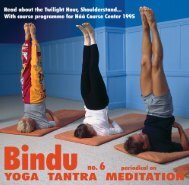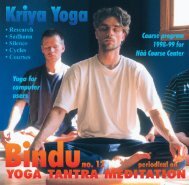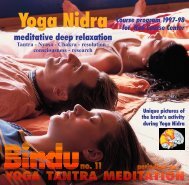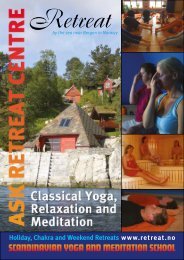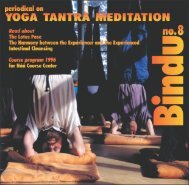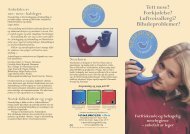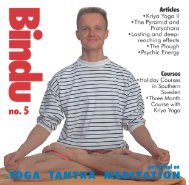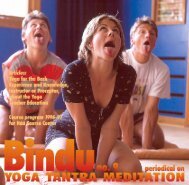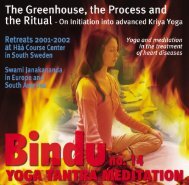Bindu 23 - engelsk 7.p65 - Scandinavian Yoga and Meditation School
Bindu 23 - engelsk 7.p65 - Scandinavian Yoga and Meditation School
Bindu 23 - engelsk 7.p65 - Scandinavian Yoga and Meditation School
You also want an ePaper? Increase the reach of your titles
YUMPU automatically turns print PDFs into web optimized ePapers that Google loves.
© 1995 Bo Olsson<br />
The winter of 1957-58, I spent at<br />
Ollerup Technical College. It was a<br />
completely new perspective that<br />
unfolded after four years as a<br />
carpenter’s apprentice. Inspiration<br />
came at first from a good Danish<br />
teacher, <strong>and</strong> then from all the<br />
interesting people who came to give<br />
lectures. One of the lecturers told us<br />
that meditation gives the ability to live<br />
in the midst of life’s bustle - <strong>and</strong> be<br />
yourself. Not buried in your own<br />
thoughts but resting in yourself, acting<br />
freely from your own center. What he<br />
said captivated me so much that I never<br />
forgot it - I quoted it in my book, <strong>Yoga</strong>,<br />
Tantra <strong>and</strong> <strong>Meditation</strong> in Daily Life: “I<br />
heard about a man who had a well-run<br />
shop, a wife <strong>and</strong> a lot of screaming<br />
children, with the shop opening on to a<br />
street in the noisiest, busiest part of<br />
town. Yet that man could cut off at any<br />
time; wherever he was, he shut his eyes<br />
<strong>and</strong> entered a deep rest within himself.<br />
And when he reopened his eyes after<br />
any length of time, he was refreshed.”<br />
After Ollerup, I went to Sweden to<br />
work at Sparreholm Sawmill, in<br />
Södermanl<strong>and</strong>. For a few months, I<br />
worked on the sorting bridge. It had a<br />
large, long “table” on which the planks<br />
were conveyed. There were a few of us<br />
sorting the planks <strong>and</strong> boards <strong>and</strong><br />
placing them on the right wagons,<br />
according to dimensions <strong>and</strong> quality. I<br />
stood furthest down the bridge with<br />
five to six wagons to load. It could get<br />
very busy <strong>and</strong> I had to get all the<br />
remaining boards on to the wagons,<br />
before they reached the end of the table.<br />
Otherwise they would pile up <strong>and</strong> I<br />
would stop the whole sawing process.<br />
However, several times a day a nail<br />
in a log would make the saw stop <strong>and</strong><br />
then nothing came out to us for a while.<br />
It was in these breaks that I began to<br />
tilt the body up to the horizontal in the<br />
Peacock (Mayurasana), while<br />
supporting myself on the edge of the<br />
table <strong>and</strong> balancing the body on the<br />
forearms. The Peacock is a very<br />
effective pose for the digestion <strong>and</strong><br />
metabolism. Yes, it is even said, that<br />
one can<br />
become<br />
immune to<br />
poisons if it<br />
is practised<br />
regularly. I<br />
was<br />
completely<br />
unaware of<br />
all this,<br />
though. I just felt like doing it <strong>and</strong><br />
mastering it. I did not “know” that I<br />
was doing yoga. At that time I had<br />
never seen a book on yoga, but it did<br />
me good <strong>and</strong> I used it several times a<br />
day. Was it something I “remembered”?<br />
At the end of the year, I attended the<br />
Forest <strong>and</strong> Sawmill College in<br />
Härnös<strong>and</strong>, Sweden for three months.<br />
Here, I began to seek a little more<br />
consciously - a quote from my diary:<br />
“26/9/1958. Today, like so many other<br />
days, I have thought how I should go<br />
about building my knowledge of other<br />
people <strong>and</strong> how I can develop my<br />
thoughts - in other words, develop a<br />
little knowledge of human nature <strong>and</strong><br />
teach myself to think as concentrated<br />
as possible.<br />
I have talked myself into being<br />
interested in philosophy without<br />
actually knowing anything about<br />
philosophy, so I have begun to read a<br />
little <strong>and</strong> have thought about starting<br />
to explore psychology. Henry David<br />
Thoureau says in “Walden”, which I<br />
am presently reading, that you should<br />
not just study life, but also live it <strong>and</strong><br />
take part in what you want to study. I<br />
quote: “Which would have advanced<br />
the most at the end of a month, - the<br />
boy who had made his own jackknife<br />
from the ore which he had dug <strong>and</strong><br />
smelted, reading as much as would be<br />
necessary for this - or the boy who had<br />
attended the lectures on metallurgy at<br />
the Institute in the meanwhile, <strong>and</strong> had<br />
received a Rodgers penknife from his<br />
father? Which would be most likely to<br />
cut his fingers?...”<br />
At the time I sought knowledge of<br />
others <strong>and</strong> not foremost of myself. That<br />
was my mistake <strong>and</strong> the reason why the<br />
psychology literature I had found did<br />
not satisfy me. All in all it was about<br />
judging others, instead of experiencing<br />
<strong>and</strong> gaining first h<strong>and</strong> knowledge.<br />
There was no guidance in how one<br />
could work with oneself, no wisdom.<br />
From Härnös<strong>and</strong>, the journey went via<br />
Copenhagen at Christmas, to Bremen<br />
in Germany. Here I was to spend a year,<br />
working in the Industrihafen in a large<br />
veneer yard. Apart from what I learnt<br />
from my older work mates, about their<br />
lives <strong>and</strong> what they had experienced<br />
during the war in the various countries<br />
where they were stationed, I became<br />
very active in my free time.<br />
I came into contact with a large<br />
international group of young people, I<br />
plunged into modern literature,<br />
especially the German writers, such as<br />
Stefan Zweig, Max Frisch, Ingeborg<br />
Bachman, Wolfgang Borchert <strong>and</strong><br />
15



